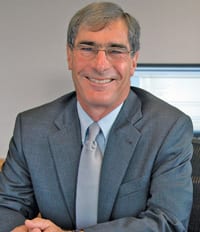By Michael Bazeley

Berkeley Law is launching a ground-breaking initiative that will significantly expand the law school’s collaboration with the judiciary and focus scholarly attention on the important challenges faced by judges.
The Berkeley Judicial Institute (BJI) will provide education and resources for jurists and help faculty and students gain a better understanding of how the judiciary works. The institute will examine judicial integrity, ethics, impartiality, political influence, the stresses inherent in being a judge, and other important issues affecting the administration of justice. It will also seek to make the work of law school scholars more relevant to the day-to-day work of jurists and increase judicial understanding of key legal specialties.
Judge Jeremy Fogel of the U.S. Northern District Court of California will lead the program as executive director. Since 2011, he has served as the director of the Federal Judicial Center (FJC) in Washington D.C., the research and education arm of the government’s judicial branch.
Fogel said BJI will take a pragmatic approach to building bridges between the legal academy and the judiciary.
More synergy needed
“One of the things I’ve become acutely aware of as a judge and director of the FJC is that there is far less synergy and collaboration between the legal academy and the judiciary than is needed,” Fogel said. “Our ability to partner with each other about immediate concerns is limited. Academics can do wonderful research, but it doesn’t always connect with judges.”
To support the mission of the institute, Berkeley Law scholars from the core faculty and the Jurisprudence and Social Policy program will pursue a wide range of research projects, working closely with judges and practitioners.
BJI will also examine judicial conduct and public criticism, provide training and resources to help judges understand complex legal issues, and examine personal challenges that judges face. It will support academic research, host workshops and working groups, develop case management resources, and work to improve the administration of justice.
“We have the opportunity to be a leader in research and training on the crucial issues of judicial independence and judicial integrity,” Dean Erwin Chemerinsky said. “In Judge Jeremy Fogel, we truly have the ideal person to lead the institute. He has decades of experience as a state and federal court judge, and for the last seven years has been the director of the FJC. I am thrilled that he has chosen to join Berkeley Law following his illustrious career on the bench and leading the FJC.”
History of judicial education
Judicial education has a robust, but focused, history at Berkeley Law. Professor Peter Menell has organized more than sixty intellectual property seminars for judges, including an annual four-day program at the school that began in 1998.
The Patent Case Management Judicial Guide, led by Menell and drawing on the expertise of leading litigators, patent jurists, and scholars, is now in its third edition and applies sound case management practices to patent litigation, one of the most challenging litigation specialties.
Meanwhile, the Berkeley Center for Law & Technology is currently working with the FJC to develop a new series of technology webinars for federal judges.
Menell and Fogel said judges face a massive array of daunting cases that involve increasingly complex legal fields, new technologies, social science, and empirical methods.
“What happens when you get a case and don’t understand the technology or the topic?” Fogel said. “How do you go about remedying that? You can’t take a crash course in economics.”
Fogel said the institute will give the school an opportunity to expand on the work it is already doing, adding in areas such as criminal law, immigration, and anti-corruption law.
Initial funding for BJI will come from the William and Flora Hewlett Foundation and from other donors.
“The challenges and daily work of judges should be central to the legal academy,’’ Menell said. “BJI will bring judges more directly into collaboration with legal scholars. Our parallel goal is to encourage legal scholars and social scientists at Berkeley and around the nation to study the role of case management in improving administration of justice.”
Personal challenges
In addition to substantive law and courtroom-related challenges, BJI will examine personal issues that are often hidden from view. The public, and even litigants, are often unaware of the stresses and isolation experienced by judges. Some of that is inherent in the position. But judges are also under increasing scrutiny as the national political and social rhetoric becomes polarized and amplified. That spotlight can be difficult for judges to handle and threatens the perception of judicial integrity.
“What happens when judges are attacked for their rulings? How do we deal with that?” Fogel said. “How do we come to terms with that?”
BJI will study “how judges tick,’’ Fogel said. “What makes good judges good, and bad judges bad. What can we understand about judges from the inside?”
Fogel has ample experience in judicial research and education. Taking leave from his day-to-day courtroom duties, he has led the FJC for the past six and a half years. The FJC examines ways to improve judicial administration, evaluates federal court practices and policies, and produces education and training for judges and court staff. As a state court judge, he was both a faculty member and program planner for California Judicial Education and Research (CJER), the California judiciary’s equivalent organization.
The new institute will not work in a vacuum. Fogel has already begun to reach out to potential partners, including the National Center for State Courts, the Institute for the Advancement of the American Legal System, and the American Bar Association, among others.
BJI will get formally under way in September.